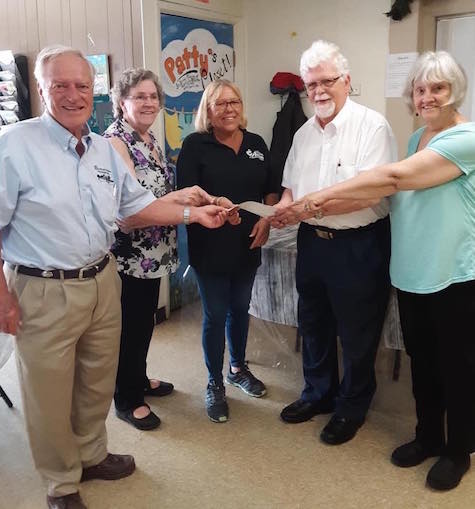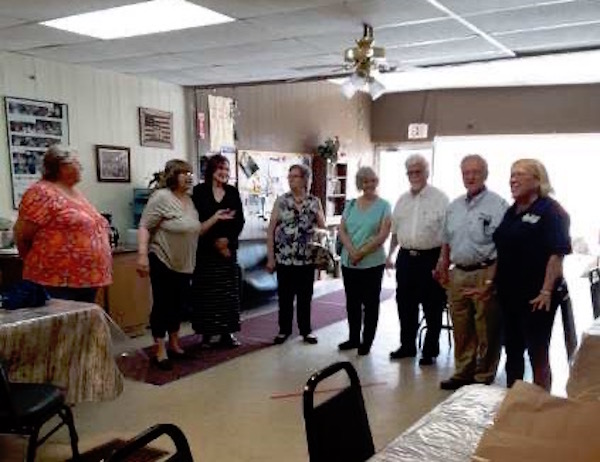Community Center in Holley receives $6K grant for food, supplies

Photos by Ginny Kropf: Debbie Rothmund, center, director of the Eastern Orleans Community Center, accepts a check for $6,000 from the Odd Fellow and Rebekah Benefit Fund. Representing the Fund are, from left, Eugene Urban, former director of the Odd Fellow and Rebekah Home in Lockport for more than 30 years; and board members Oradell Banker, Clement Olson and Barbara Quick.
HOLLEY – The Eastern Orleans Community Center got a boost Friday when representatives from the Odd Fellow and Rebekah Benefit Fund visited the center to present them with a check for $6,000.
Appearing on behalf of the Fund were Eugene Urban, former director of the Odd Fellow and Rebekah Home in Lockport for more than 30 years; and board members Oradell Banker of Mehoopany, Pa.; Barbara Quick of Binghamton; and Clement Olson of North Tonawanda.
The donation came about because the Odd Fellow and Rebekah Benefit Fund had money to donate from the sale of their Odd Fellow and Rebekah Rehabilitation Center in Lockport 3 1/2 years ago.
“The courts decided how the money was to be dispersed,” said Banker. “We have money available to donate to agencies which provide or support delivery of programs to promote physical, social or mental health. Healthcare is more than a doctor, dentist or hospital.”
Banker went on her computer looking for 501c3 agencies.
“I read about each one that fit our criteria,” she said. “There was the Eastern Orleans Community Center, and I called Debbie and told her we have financial help available, if you’re interested.”
Debbie Rothmund runs the Community Center and Banker told her how to get a grant application. Rothmund wrote the grant for the purchase of food, containers, dehumidifiers and computers. Once it was received, the donation committee reviewed it and took it to the board, which approved the $6,000 gift.
“I can’t tell you how much we appreciate it,” Rothmund said.
Banker said they’d like to come in the future and see how the Community Center is making use of the funds.
During the week, the Community Center provides meals five days a week. During the pandemic, they provided 800 Grab and Go meals a month, and still continue to do it.
“It’s not just that we feed people,” said Annette Finch, director of Emergency Services at Community Action, which runs the Community Center. “The people who come in here take of each other. If one doesn’t show up one day, someone else is on the phone checking up on them. We also make sure the people who can’t cook go home with food for the weekends.”
Another service the Community Center provides is making food donations from Wegman’s three times a week available outside for people to pick up.
A donation last year from the local Lions Club has resulted in another service to the community, Finch said.
“With their donation we were able to buy a generator, and we are now considered a warming center,” she said.
She cited an instance last winter when several families were forced from their burning apartment house in the middle of the night. The victims were taken in their pajamas, some shoeless, to the Community Center, where they were warmed and fed. A clothing depot maintained next door by the Center provided shoes and clothing for the families.

Four representatives from the Odd Fellow & Rebekah Benefit Fund visited the Eastern Orleans Community Center in Holley on Friday afternoon to present them with a donation. From Community Action are Rachael Escobar, assistant at the Center; Annette Finch, director of Emergency Services; Renee Hungerford, executive director; and from the Benefit Fund, Oradell Banker of Mehoopany, Pa., Barbara Quick of Binghamton, Clement Olson of North Tonawanda and Eugene Urban of East Amherst. At right is Debbie Rothmund, director of the Community Center.
Rothmund added the Center is a destination for many children who come after school when their parents are working.
“They know we are a safe place to hang out,” she said.
The Center also sponsored cooking classes and special speakers before Covid restrictions were placed on their activities.
“We are going to continue those things, now that we can get back in the swing of things,” Rothmund said.
“I don’t know what people in the community would do without the Community Center,” Finch added.
Urban explained how the Odd Fellow and Rebekah Lodge has a history steeped in helping others.
“The primary tenets of our organization are caring for widows and orphans and burying their dead,” he said. These go back four or five hundred years, when somebody took the responsibility of seeing that widows had food on the table, that their children were cared for and their dead were buried.”
Olson explained how centuries ago the Masonic Lodge in England was formed by men whose livelihood was the masonic trade.
“When a group of men wanted to join, they were refused because they were not masons by trade,” Olson said. “Those men decided to form their own group, calling themselves ‘Odd Fellows’ due to the fact it was considered odd at the time for someone to care about others, such as widows and their children.”





































































